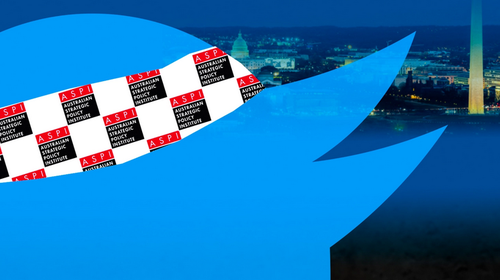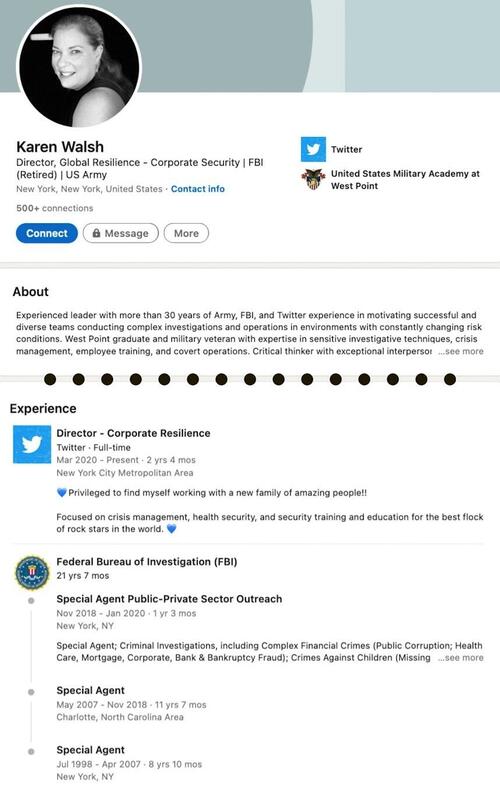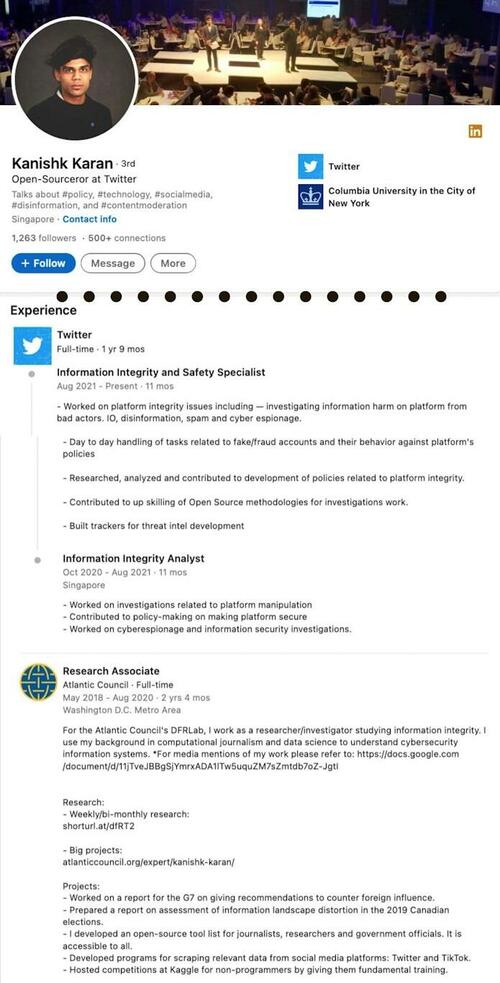
Authored by Alan MacLeod via Mint Press News,
Twitter has been on a recruitment drive of late, hiring a host of former feds and spies. Studying a number of employment and recruitment websites, MintPress has ascertained that the social media giant has, in recent years, recruited dozens of individuals from the national security state to work in the fields of security, trust, safety and content.
Chief amongst these is the Federal Bureau of Investigation. The FBI is generally known as a domestic security and intelligence force. However, it has recently expanded its remit into cyberspace. “The FBI’s investigative authority is the broadest of all federal law enforcement agencies,” the “About” section of its website informs readers. “The FBI has divided its investigations into a number of programs, such as domestic and international terrorism, foreign counterintelligence [and] cyber crime,” it adds.
For example, in 2019, Dawn Burton (the former director of Washington operations for Lockheed Martin) was poached from her job as senior innovation advisor to the director at the FBI to become senior director of strategy and operations for legal, public policy, trust and safety at Twitter. The following year, Karen Walsh went straight from 21 years at the bureau to become director of corporate resilience at the silicon valley giant. Twitter’s deputy general counsel and vice president of legal, Jim Baker, also spent four years at the FBI between 2014 and 2018, where his resumé notes he rose to the role of senior strategic advisor.
Meanwhile, Mark Jaroszewski ended his 21-year posting as a supervisory special agent in the Bay Area to take up a position at Twitter, rising to become director of corporate security and risk. And Douglas Turner spent 14 years as a senior special agent and SWAT Team leader before being recruited to serve in Twitter’s corporate and executive security services. Previously, Turner had also spent seven years as a secret service special agent with the Department of Homeland Security.
When asked to comment by MintPress, former FBI agent and whistleblower Coleen Rowley said that she was “not surprised at all” to see FBI agents now working for the very tech companies the agency polices, stating that there now exists a “revolving door” between the FBI and the areas they are trying to regulate. This created a serious conflict of interests in her mind, as many agents have one eye on post-retirement jobs. “The truth is that at the FBI 50% of all the normal conversations that people had were about how you were going to make money after retirement,” she said.
Many former FBI officials hold influential roles within Twitter. For instance, in 2020, Matthew W. left a 15-year career as an intelligence program manager at the FBI to take up the post of senior director of product trust at Twitter. Patrick G., a 23-year FBI supervisory special agent, is now head of corporate security. And Twitter’s director of insider risk and security investigations, Bruce A., was headhunted from his role as a supervisory special agent at the bureau. His resumé notes that at the FBI he held “[v]arious intelligence and law enforcement roles in the US, Africa, Europe, and the Middle East” and was a “human intelligence and counterintelligence regional specialist.” (On employment sites such as LinkedIn, many users choose not to reveal their full names.)
Meanwhile, between 2007 and 2021 Jeff Carlton built up a distinguished career in the United States Marine Corps, rising to become a senior intelligence analyst. Between 2014 and 2017, his LinkedIn profile notes, he worked for both the CIA and FBI, authored dozens of official reports, some of which were read by President Barack Obama. Carlton describes his role as a “problem-solver” and claims to have worked in many “dynamic, high-pressure environments” such as Iraq and Korea. In May 2021, he left official service to become a senior program manager at Twitter, responsible for dealing with the company’s “highest-profile trust and safety escalations.”
Other former FBI staff are employed by Twitter, such as Cherrelle Y. as a policy domain specialist and Laura D. as a senior analyst in global risk intelligence.
Many of those listed above were active in the FBI’s public outreach programs, a practice sold as a community trust-building initiative. According to Rowley, however, these also function as “ways for officials to meet the important people that would give them jobs after retirement.” “It basically inserts a huge conflict of interest,” she told MintPress. “It warps and perverts the criminal investigative work that agents do when they are still working as agents because they anticipate getting lucrative jobs after retiring or leaving the FBI.”
Rowley – who in 2002 was named, along with two other whistleblowers, as Time magazine’s Person of the Year – was skeptical that there was anything seriously nefarious about the hiring of so many FBI agents, suggesting that Twitter could be using them as sources of information and intelligence. She stated:
Retired agents often maintained good relationships and networks with current agents. So they can call up their old buddy and find out stuff… There were certainly instances of retired agents for example trying to find out if there was an investigation of so and so. And if you are working for a company, that company is going to like that influence.”
Rowley also suggested that hiring people from various three-letter agencies gave them a credibility boost. “These [tech] companies are using the mythical aura of the FBI. They can point to somebody and say ‘oh, you can trust us; our CEO or CFO is FBI,’” she explained.
Twitter certainly has endorsed the FBI as a credible actor, allowing the organization to play a part in regulating the global dissemination of information on its platform. In September 2020, it put out a statement thanking the federal agency. “We wish to express our gratitude to the FBI’s Foreign Influence Task Force for their close collaboration and continued support of our work to protect the public conversation at this critical time,” the statement read.
One month later, the company announced that the FBI was feeding it intelligence and that it was complying with their requests for deletion of accounts. “Based on intel provided by the FBI, last night we removed approximately 130 accounts that appeared to originate in Iran. They were attempting to disrupt the public conversation during the first 2020 U.S. Presidential Debate,” Twitter’s safety team wrote.
Yet the evidence they supplied of this supposed threat to American democracy was notably weak. All four of the messages from this Iranian operation that Twitter itself shared showed that none of them garnered any likes or retweets whatsoever, meaning that essentially nobody saw them. This was, in other words, a completely routine cleanup operation of insignificant troll accounts. Yet the announcement allowed Twitter to present the FBI as on the side of democracy and place the idea into the public psyche that the election was under threat from foreign actors.
Based on intel provided by the @FBI, last night we removed approximately 130 accounts that appeared to originate in Iran. They were attempting to disrupt the public conversation during the first 2020 US Presidential Debate.
— Twitter Safety (@TwitterSafety) October 1, 2020
Iran has been a favorite Twitter target in the past. In 2009, at the behest of the U.S. government, it postponed routine maintenance of the site, which would have required taking it offline. This was because an anti-government protest movement in Tehran was using the app to communicate and the U.S. did not want the demonstrations’ regime-change potential to be stymied.
A carnival of spooks
The FBI is far from the only state security agency filling Twitter’s ranks. Shortly after leaving a 10-year career as a CIA analyst, Michael Scott Robinson was hired to become a senior policy manager for site integrity, trust and safety.
The California-based app has also recruited heavily from the Atlantic Council, a NATO cutout organization that serves as the military alliance’s think tank. The council is sponsored by NATO, led by senior NATO generals and regularly plays out regime-change scenarios in enemy states, such as China.
The Atlantic Council has been associated with many of the most egregious fake news plants of the last few years. It published a series of lurid reports alleging that virtually every political group in Europe challenging the status quo – from the Labour Party under Jeremy Corbyn and UKIP in Great Britain to PODEMOS and Vox in Spain and Syriza and Golden Dawn in Greece – were all secretly “the Kremlin’s Trojan Horses.” Atlantic Council employee Michael Weiss was also very likely the creator of the shadowy organization PropOrNot, a group that anonymously published a list of fake-news websites that regularly peddled Kremlin disinformation. Included in this list was virtually every anti-war alternative media outlet one could think of – from MintPress to Truthout, TruthDig and The Black Agenda Report. Also included were pro-Trump websites like The Drudge Report, and liberatarian ventures like Antiwar.com and The Ron Paul Institute.
PropOrNot’s list was immediately heralded in the corporate press, and was the basis for a wholescale algorithm shift at Google and other big tech platforms, a shift that saw traffic to alternative media sites crash overnight, never to recover. Thus, the allegation of a huge (Russian) state-sponsored attempt to influence the media was itself an intelligence op by the U.S. national security state.
In 2020, Kanishk Karan left his job as a research associate at the Atlantic Council’s Digital Forensics Research (DFR) Lab to join Twitter as information integrity and safety specialist – essentially helping to control what Twitter sees as legitimate information and nefarious disinformation. Another DFR Lab graduate turned Twitter employee is Daniel Weimert, who is now a senior public policy associate for Russia – a key target of the Atlantic Council. Meanwhile, Sarah Oh is simultaneously an Atlantic Council DFR Lab non-resident senior fellow and a Twitter advisor, her social media bio noting she works on “high risk trust and safety issues.”
In 2019, Twitter also hired Greg Andersen straight from NATO to work on cybercrime policy. There is sparse information on what Andersen did at NATO, but, alarmingly, his own LinkedIn profile stated simply that he worked on “psychological operations” for the military alliance. After MintPress highlighted this fact in an article in April, he removed all mention of “psychological operations” from his profile, claiming now to have merely worked as a NATO “researcher.” Andersen left Twitter in the summer of last year to work as a product policy manager for the popular video platform TikTok.
Twitter also directly employs active army officers. In 2019, Gordon Macmillan, the head of editorial for the entire Europe, Middle East and Africa region was revealed to be an officer in the British Army’s notorious 77th Brigade – a unit dedicated to online warfare and psychological operations. This bombshell news was steadfastly ignored across the media.
Positions of power and control
With nearly 400 million global users, there is no doubt that Twitter has grown to become a platform large and influential enough to necessitate extensive security measures, as actors of all stripes attempt to use the service to influence public opinion and political actions. There is also no doubt that there is a limited pool of people qualified in these sorts of fields.
But recruiting largely from the U.S. national security state fundamentally undermines claims Twitter makes about its neutrality. The U.S. government is the source of some of the largest and most extensive influence operations in the world. As far back as 2011, The Guardian reported on the existence of a massive, worldwide U.S. military online influence campaign in which it had designed software that allowed its personnel to “secretly manipulate social media sites by using fake online personas to influence internet conversations and spread pro-American propaganda.” The program boasts that the background of these personas is so convincing that psychological operations soldiers can be sure to work “without fear of being discovered by sophisticated adversaries.” Yet Twitter appears to be recruiting from the source of the problem.
These former national security state officials are not being employed in politically neutral departments such as sales or customer service, but in security, trust and content, meaning that some hold considerable sway over what messages and information are promoted, and what is suppressed, demoted or deleted.
It could be said that poachers-turned-gamekeepers often play a crucial role in safety and protection, as they know how bad actors think and operate. But there exists little evidence that any of these national security state operatives have changed their stances. Twitter is not hiring whistleblowers or dissidents. It appears, then, that some of these people are essentially doing the same job they were doing before, but now in the private sector. And few are even acknowledging that there is anything wrong with moving from big government to big tech, as if the U.S. national security state and the fourth estate are allies, rather than adversaries.
That Twitter is already working so closely with the FBI and other agencies makes it easy for them to recruit from the federal pool. As Rowley said, “over a period of time these people will be totally in sync with the mindset of Twitter and other social media platforms. So from the company’s standpoint, they are not hiring somebody new. They already know this person. They know where they stand on things.”
Is there a problem?
Some might ask “What is the problem with Twitter actively recruiting from the FBI, CIA and other three-letter agencies?” They, after all, are experts in studying online disinformation and propaganda. One is optical. If a Russian-owned social media app’s trust, security and content moderation was run by former KGB or FSB agents and still insisted it was a politically neutral platform, the entire world would laugh.
But apart from this, the huge influx of security state personnel into Twitter’s decision-making ranks means that the company will start to view every problem in the same manner as the U.S. government does – and act accordingly. “In terms of their outlooks on the world and on the question of misinformation and internet security, you couldn’t get a better field of professionals who are almost inherently going to be more in tune with the government’s perspective,” Rowley said.
Thus, when policing the platform for disinformation and influence campaigns, the former FBI and CIA agents and Atlantic Council fellows only ever seem to find them emanating from enemy states and never from the U.S. government itself. This is because their backgrounds and outlooks condition them to consider Washington to be a unique force for good.
This one-sided view of disinformation can be seen by studying the reports Twitter has published on state-linked information operations. The entire list of countries it has identified as engaging in these campaigns are as follows: Russia (in 7 reports), Iran (in 5 reports), China (4 reports), Saudi Arabia (4 reports), Venezuela (3 reports), Egypt (2 reports), Cuba, Serbia, Bangladesh, the UAE, Ecuador, Ghana, Nigeria, Honduras, Indonesia, Turkey, Thailand, Armenia, Spain, Tanzania, Mexico and Uganda.
One cannot help noticing that this list correlates quite closely to a hit list of U.S. government adversaries. All countries carry out disinfo campaigns to a certain extent. But these “former” spooks and feds are unlikely to point the finger at their former colleagues or sister organizations or investigate their operations.
The Cold (cyber)war
Twitter has mirrored U.S. hostility towards states like Russia, China, Iran and Cuba, attempting to suppress the reach and influence of their state media by adding warning messages to the tweets of journalists and accounts affiliated with those governments. “State-affiliated media is defined as outlets where the state exercises control over editorial content through financial resources, direct or indirect political pressures, and/or control over production and distribution,” it noted.
In a rather bizarre addendum, it explained that it would not be doing the same to state-affiliated media or personalities from other countries, least of all the U.S. “State-financed media organizations with editorial independence, like the BBC in the U.K. or NPR in the U.S. for example, are not defined as state-affiliated media for the purposes of this policy,” it wrote. It did not explain how it decided that Cuban, Russian, Chinese or Iranian journalists did not have editorial independence, but British and American ones did – this was taken for granted. The effect of the action has been a throttling of ideas and narratives from enemy states and an amplification of those coming from Western state media.
As the U.S. ramps up tensions with Beijing, so too has Twitter aggressively shut down pro-China voices on its platform. In 2020, it banned 170,000 accounts it said were “spreading geopolitical narratives favorable to the Communist Party of China,” such as praising its handling of the Covid-19 pandemic or expressing opposition to the Hong Kong protests, both of which are majority views in China. Importantly, the Silicon Valley company did not claim that these accounts were controlled by the government; merely sharing these opinions was grounds enough for deletion.
The group behind Twitter’s decision to ban those Chinese accounts was the Australian Strategic Policy Institute (ASPI), a deeply controversial think tank funded by the Pentagon, the State Department and a host of weapons manufacturers. ASPI has constantly peddled conspiracy theories about China and called for ramping up tensions with the Asian nation.

Perhaps most notable, however, was Twitter’s announcement last year that it was deleting dozens of accounts for the new violation of “undermining faith in the NATO alliance.” The statement was widely ridiculed online by users. But few noted that the decision was based upon a partnership with the Stanford Internet Observatory, a counter-disinformation think tank filled with former spooks and state officials and headed by an individual who is on the advisory board of NATO’s Collective Cybersecurity Center of Excellence. That Twitter is working so closely with organizations that are clearly intelligence industry catspaws should concern all users.
Not just Twitter
While some might be alarmed that Twitter is cultivating such an intimate relationship with the FBI and other groups belonging to the secret state, it is perhaps unfair to single it out, as many social media platforms are doing the same. Facebook, for example, has entered into a formal partnership with the Atlantic Council’s Digital Forensics Research Lab, whereby the latter holds significant influence over 2.9 billion users’ news feeds, helping to decide what content to promote and what content to suppress. The NATO cutout organization now serves as Facebook’s “eyes and ears,” according to a Facebook press release. Anti-war and anti-establishment voices across the world have reported massive drops in traffic on the platform.
The social media giant also hired former NATO Press Secretary Ben Nimmo to be its head of intelligence. Nimmo subsequently used his power to attempt to swing the election in Nicaragua away from the leftist Sandinista Party and towards the far-right, pro-U.S. candidate, deleting hundreds of left-wing voices in the week of the election, claiming they were engaging in “inauthentic behavior.” When these individuals (including some well-known personalities) poured onto Twitter, recording video messages proving they were not bots, Twitter deleted those accounts too, in what one commentator called a Silicon Valley “double tap strike.”
An April MintPress study revealed how TikTok, too, has been filling its organization with alumni of the Atlantic Council, NATO, the CIA and the State Department. As with Twitter, these new TikTok employees largely work in highly politically sensitive fields such as trust, safety, security and content moderation, meaning these state operatives hold influence over the direction of the company and what content is promoted and what is demoted.
Likewise, in 2017, content aggregation site Reddit plucked Jessica Ashooh from the Atlantic Council’s Middle East Strategy Task Force to become its new director of policy, despite the fact that she had few relevant qualifications or experience in the field.

In corporate media too, we have seen a widespread infiltration of former security officials into the upper echelons of news organizations. So normalized is the penetration of the national security state into the media that is supposed to be holding it to account, that few reacted in 2015 when Dawn Scalici left her job as national intelligence manager for the Western hemisphere at the Director of National Intelligence to become the global business director of international news conglomerate Thomson Reuters. Scalici, a 33-year CIA veteran who had worked her way up to become a director in the organization, was open about what her role was. In a blog post on the Reuters website, she wrote that she was there to “meet the disparate needs of the U.S. Government” – a statement that is at odds with even the most basic journalistic concepts of impartiality and holding the powerful to account.
Meanwhile, cable news outlets routinely employ a wide range of “former” agents and mandarins as trusted personalities and experts. These include former CIA Directors John Brennan (NBC, MSNBC) and Michael Hayden (CNN), ex-Director of National Intelligence James Clapper (CNN), and former Homeland Security Advisor Frances Townsend (CBS). And news for so many Americans comes delivered through ex-CIA interns like Anderson Cooper (CNN), CIA-applicants like Tucker Carlson (Fox), or by Mika Brzezinski (MSNBC), the daughter of a powerful national security advisor. The FBI has its own former agents on TV as well, with talking heads such as James Gagliano (Fox), Asha Rangappa (CNN) and Frank Figliuzzi (NBC, MSNBC) becoming household names. In short, then, the national security state once used to infiltrate the media. Today, however, the national security state is the media.
Social media holds enormous influence in today’s society. While this article is not alleging that anyone mentioned is a bad actor or does not genuinely care about the spread of disinformation, it is highlighting a glaring conflict of interest. Through its agencies, the U.S. government regularly plants fake news and false information. Therefore, social media hiring individuals straight from the FBI, CIA, NATO and other groups to work on regulating disinformation is a fundamentally flawed practice. One of media’s primary functions is to serve as a fourth estate; a force that works to hold the government and its agencies to account. Yet instead of doing that, increasingly it is collaborating with them. Such are these increasing interlocking connections that it is becoming increasingly difficult to see where big government ends and big media begins.
Authored by Alan MacLeod via Mint Press News,
Twitter has been on a recruitment drive of late, hiring a host of former feds and spies. Studying a number of employment and recruitment websites, MintPress has ascertained that the social media giant has, in recent years, recruited dozens of individuals from the national security state to work in the fields of security, trust, safety and content.
Chief amongst these is the Federal Bureau of Investigation. The FBI is generally known as a domestic security and intelligence force. However, it has recently expanded its remit into cyberspace. “The FBI’s investigative authority is the broadest of all federal law enforcement agencies,” the “About” section of its website informs readers. “The FBI has divided its investigations into a number of programs, such as domestic and international terrorism, foreign counterintelligence [and] cyber crime,” it adds.
For example, in 2019, Dawn Burton (the former director of Washington operations for Lockheed Martin) was poached from her job as senior innovation advisor to the director at the FBI to become senior director of strategy and operations for legal, public policy, trust and safety at Twitter. The following year, Karen Walsh went straight from 21 years at the bureau to become director of corporate resilience at the silicon valley giant. Twitter’s deputy general counsel and vice president of legal, Jim Baker, also spent four years at the FBI between 2014 and 2018, where his resumé notes he rose to the role of senior strategic advisor.
Meanwhile, Mark Jaroszewski ended his 21-year posting as a supervisory special agent in the Bay Area to take up a position at Twitter, rising to become director of corporate security and risk. And Douglas Turner spent 14 years as a senior special agent and SWAT Team leader before being recruited to serve in Twitter’s corporate and executive security services. Previously, Turner had also spent seven years as a secret service special agent with the Department of Homeland Security.
When asked to comment by MintPress, former FBI agent and whistleblower Coleen Rowley said that she was “not surprised at all” to see FBI agents now working for the very tech companies the agency polices, stating that there now exists a “revolving door” between the FBI and the areas they are trying to regulate. This created a serious conflict of interests in her mind, as many agents have one eye on post-retirement jobs. “The truth is that at the FBI 50% of all the normal conversations that people had were about how you were going to make money after retirement,” she said.
Many former FBI officials hold influential roles within Twitter. For instance, in 2020, Matthew W. left a 15-year career as an intelligence program manager at the FBI to take up the post of senior director of product trust at Twitter. Patrick G., a 23-year FBI supervisory special agent, is now head of corporate security. And Twitter’s director of insider risk and security investigations, Bruce A., was headhunted from his role as a supervisory special agent at the bureau. His resumé notes that at the FBI he held “[v]arious intelligence and law enforcement roles in the US, Africa, Europe, and the Middle East” and was a “human intelligence and counterintelligence regional specialist.” (On employment sites such as LinkedIn, many users choose not to reveal their full names.)
Meanwhile, between 2007 and 2021 Jeff Carlton built up a distinguished career in the United States Marine Corps, rising to become a senior intelligence analyst. Between 2014 and 2017, his LinkedIn profile notes, he worked for both the CIA and FBI, authored dozens of official reports, some of which were read by President Barack Obama. Carlton describes his role as a “problem-solver” and claims to have worked in many “dynamic, high-pressure environments” such as Iraq and Korea. In May 2021, he left official service to become a senior program manager at Twitter, responsible for dealing with the company’s “highest-profile trust and safety escalations.”
Other former FBI staff are employed by Twitter, such as Cherrelle Y. as a policy domain specialist and Laura D. as a senior analyst in global risk intelligence.
Many of those listed above were active in the FBI’s public outreach programs, a practice sold as a community trust-building initiative. According to Rowley, however, these also function as “ways for officials to meet the important people that would give them jobs after retirement.” “It basically inserts a huge conflict of interest,” she told MintPress. “It warps and perverts the criminal investigative work that agents do when they are still working as agents because they anticipate getting lucrative jobs after retiring or leaving the FBI.”
Rowley – who in 2002 was named, along with two other whistleblowers, as Time magazine’s Person of the Year – was skeptical that there was anything seriously nefarious about the hiring of so many FBI agents, suggesting that Twitter could be using them as sources of information and intelligence. She stated:
Retired agents often maintained good relationships and networks with current agents. So they can call up their old buddy and find out stuff… There were certainly instances of retired agents for example trying to find out if there was an investigation of so and so. And if you are working for a company, that company is going to like that influence.”
Rowley also suggested that hiring people from various three-letter agencies gave them a credibility boost. “These [tech] companies are using the mythical aura of the FBI. They can point to somebody and say ‘oh, you can trust us; our CEO or CFO is FBI,’” she explained.
Twitter certainly has endorsed the FBI as a credible actor, allowing the organization to play a part in regulating the global dissemination of information on its platform. In September 2020, it put out a statement thanking the federal agency. “We wish to express our gratitude to the FBI’s Foreign Influence Task Force for their close collaboration and continued support of our work to protect the public conversation at this critical time,” the statement read.
One month later, the company announced that the FBI was feeding it intelligence and that it was complying with their requests for deletion of accounts. “Based on intel provided by the FBI, last night we removed approximately 130 accounts that appeared to originate in Iran. They were attempting to disrupt the public conversation during the first 2020 U.S. Presidential Debate,” Twitter’s safety team wrote.
Yet the evidence they supplied of this supposed threat to American democracy was notably weak. All four of the messages from this Iranian operation that Twitter itself shared showed that none of them garnered any likes or retweets whatsoever, meaning that essentially nobody saw them. This was, in other words, a completely routine cleanup operation of insignificant troll accounts. Yet the announcement allowed Twitter to present the FBI as on the side of democracy and place the idea into the public psyche that the election was under threat from foreign actors.
Based on intel provided by the @FBI, last night we removed approximately 130 accounts that appeared to originate in Iran. They were attempting to disrupt the public conversation during the first 2020 US Presidential Debate.
— Twitter Safety (@TwitterSafety) October 1, 2020
Iran has been a favorite Twitter target in the past. In 2009, at the behest of the U.S. government, it postponed routine maintenance of the site, which would have required taking it offline. This was because an anti-government protest movement in Tehran was using the app to communicate and the U.S. did not want the demonstrations’ regime-change potential to be stymied.
A carnival of spooks
The FBI is far from the only state security agency filling Twitter’s ranks. Shortly after leaving a 10-year career as a CIA analyst, Michael Scott Robinson was hired to become a senior policy manager for site integrity, trust and safety.
The California-based app has also recruited heavily from the Atlantic Council, a NATO cutout organization that serves as the military alliance’s think tank. The council is sponsored by NATO, led by senior NATO generals and regularly plays out regime-change scenarios in enemy states, such as China.
The Atlantic Council has been associated with many of the most egregious fake news plants of the last few years. It published a series of lurid reports alleging that virtually every political group in Europe challenging the status quo – from the Labour Party under Jeremy Corbyn and UKIP in Great Britain to PODEMOS and Vox in Spain and Syriza and Golden Dawn in Greece – were all secretly “the Kremlin’s Trojan Horses.” Atlantic Council employee Michael Weiss was also very likely the creator of the shadowy organization PropOrNot, a group that anonymously published a list of fake-news websites that regularly peddled Kremlin disinformation. Included in this list was virtually every anti-war alternative media outlet one could think of – from MintPress to Truthout, TruthDig and The Black Agenda Report. Also included were pro-Trump websites like The Drudge Report, and liberatarian ventures like Antiwar.com and The Ron Paul Institute.
PropOrNot’s list was immediately heralded in the corporate press, and was the basis for a wholescale algorithm shift at Google and other big tech platforms, a shift that saw traffic to alternative media sites crash overnight, never to recover. Thus, the allegation of a huge (Russian) state-sponsored attempt to influence the media was itself an intelligence op by the U.S. national security state.
In 2020, Kanishk Karan left his job as a research associate at the Atlantic Council’s Digital Forensics Research (DFR) Lab to join Twitter as information integrity and safety specialist – essentially helping to control what Twitter sees as legitimate information and nefarious disinformation. Another DFR Lab graduate turned Twitter employee is Daniel Weimert, who is now a senior public policy associate for Russia – a key target of the Atlantic Council. Meanwhile, Sarah Oh is simultaneously an Atlantic Council DFR Lab non-resident senior fellow and a Twitter advisor, her social media bio noting she works on “high risk trust and safety issues.”
In 2019, Twitter also hired Greg Andersen straight from NATO to work on cybercrime policy. There is sparse information on what Andersen did at NATO, but, alarmingly, his own LinkedIn profile stated simply that he worked on “psychological operations” for the military alliance. After MintPress highlighted this fact in an article in April, he removed all mention of “psychological operations” from his profile, claiming now to have merely worked as a NATO “researcher.” Andersen left Twitter in the summer of last year to work as a product policy manager for the popular video platform TikTok.
Twitter also directly employs active army officers. In 2019, Gordon Macmillan, the head of editorial for the entire Europe, Middle East and Africa region was revealed to be an officer in the British Army’s notorious 77th Brigade – a unit dedicated to online warfare and psychological operations. This bombshell news was steadfastly ignored across the media.
Positions of power and control
With nearly 400 million global users, there is no doubt that Twitter has grown to become a platform large and influential enough to necessitate extensive security measures, as actors of all stripes attempt to use the service to influence public opinion and political actions. There is also no doubt that there is a limited pool of people qualified in these sorts of fields.
But recruiting largely from the U.S. national security state fundamentally undermines claims Twitter makes about its neutrality. The U.S. government is the source of some of the largest and most extensive influence operations in the world. As far back as 2011, The Guardian reported on the existence of a massive, worldwide U.S. military online influence campaign in which it had designed software that allowed its personnel to “secretly manipulate social media sites by using fake online personas to influence internet conversations and spread pro-American propaganda.” The program boasts that the background of these personas is so convincing that psychological operations soldiers can be sure to work “without fear of being discovered by sophisticated adversaries.” Yet Twitter appears to be recruiting from the source of the problem.
These former national security state officials are not being employed in politically neutral departments such as sales or customer service, but in security, trust and content, meaning that some hold considerable sway over what messages and information are promoted, and what is suppressed, demoted or deleted.
It could be said that poachers-turned-gamekeepers often play a crucial role in safety and protection, as they know how bad actors think and operate. But there exists little evidence that any of these national security state operatives have changed their stances. Twitter is not hiring whistleblowers or dissidents. It appears, then, that some of these people are essentially doing the same job they were doing before, but now in the private sector. And few are even acknowledging that there is anything wrong with moving from big government to big tech, as if the U.S. national security state and the fourth estate are allies, rather than adversaries.
That Twitter is already working so closely with the FBI and other agencies makes it easy for them to recruit from the federal pool. As Rowley said, “over a period of time these people will be totally in sync with the mindset of Twitter and other social media platforms. So from the company’s standpoint, they are not hiring somebody new. They already know this person. They know where they stand on things.”
Is there a problem?
Some might ask “What is the problem with Twitter actively recruiting from the FBI, CIA and other three-letter agencies?” They, after all, are experts in studying online disinformation and propaganda. One is optical. If a Russian-owned social media app’s trust, security and content moderation was run by former KGB or FSB agents and still insisted it was a politically neutral platform, the entire world would laugh.
But apart from this, the huge influx of security state personnel into Twitter’s decision-making ranks means that the company will start to view every problem in the same manner as the U.S. government does – and act accordingly. “In terms of their outlooks on the world and on the question of misinformation and internet security, you couldn’t get a better field of professionals who are almost inherently going to be more in tune with the government’s perspective,” Rowley said.
Thus, when policing the platform for disinformation and influence campaigns, the former FBI and CIA agents and Atlantic Council fellows only ever seem to find them emanating from enemy states and never from the U.S. government itself. This is because their backgrounds and outlooks condition them to consider Washington to be a unique force for good.
This one-sided view of disinformation can be seen by studying the reports Twitter has published on state-linked information operations. The entire list of countries it has identified as engaging in these campaigns are as follows: Russia (in 7 reports), Iran (in 5 reports), China (4 reports), Saudi Arabia (4 reports), Venezuela (3 reports), Egypt (2 reports), Cuba, Serbia, Bangladesh, the UAE, Ecuador, Ghana, Nigeria, Honduras, Indonesia, Turkey, Thailand, Armenia, Spain, Tanzania, Mexico and Uganda.
One cannot help noticing that this list correlates quite closely to a hit list of U.S. government adversaries. All countries carry out disinfo campaigns to a certain extent. But these “former” spooks and feds are unlikely to point the finger at their former colleagues or sister organizations or investigate their operations.
The Cold (cyber)war
Twitter has mirrored U.S. hostility towards states like Russia, China, Iran and Cuba, attempting to suppress the reach and influence of their state media by adding warning messages to the tweets of journalists and accounts affiliated with those governments. “State-affiliated media is defined as outlets where the state exercises control over editorial content through financial resources, direct or indirect political pressures, and/or control over production and distribution,” it noted.
In a rather bizarre addendum, it explained that it would not be doing the same to state-affiliated media or personalities from other countries, least of all the U.S. “State-financed media organizations with editorial independence, like the BBC in the U.K. or NPR in the U.S. for example, are not defined as state-affiliated media for the purposes of this policy,” it wrote. It did not explain how it decided that Cuban, Russian, Chinese or Iranian journalists did not have editorial independence, but British and American ones did – this was taken for granted. The effect of the action has been a throttling of ideas and narratives from enemy states and an amplification of those coming from Western state media.
As the U.S. ramps up tensions with Beijing, so too has Twitter aggressively shut down pro-China voices on its platform. In 2020, it banned 170,000 accounts it said were “spreading geopolitical narratives favorable to the Communist Party of China,” such as praising its handling of the Covid-19 pandemic or expressing opposition to the Hong Kong protests, both of which are majority views in China. Importantly, the Silicon Valley company did not claim that these accounts were controlled by the government; merely sharing these opinions was grounds enough for deletion.
The group behind Twitter’s decision to ban those Chinese accounts was the Australian Strategic Policy Institute (ASPI), a deeply controversial think tank funded by the Pentagon, the State Department and a host of weapons manufacturers. ASPI has constantly peddled conspiracy theories about China and called for ramping up tensions with the Asian nation.

Perhaps most notable, however, was Twitter’s announcement last year that it was deleting dozens of accounts for the new violation of “undermining faith in the NATO alliance.” The statement was widely ridiculed online by users. But few noted that the decision was based upon a partnership with the Stanford Internet Observatory, a counter-disinformation think tank filled with former spooks and state officials and headed by an individual who is on the advisory board of NATO’s Collective Cybersecurity Center of Excellence. That Twitter is working so closely with organizations that are clearly intelligence industry catspaws should concern all users.
Not just Twitter
While some might be alarmed that Twitter is cultivating such an intimate relationship with the FBI and other groups belonging to the secret state, it is perhaps unfair to single it out, as many social media platforms are doing the same. Facebook, for example, has entered into a formal partnership with the Atlantic Council’s Digital Forensics Research Lab, whereby the latter holds significant influence over 2.9 billion users’ news feeds, helping to decide what content to promote and what content to suppress. The NATO cutout organization now serves as Facebook’s “eyes and ears,” according to a Facebook press release. Anti-war and anti-establishment voices across the world have reported massive drops in traffic on the platform.
The social media giant also hired former NATO Press Secretary Ben Nimmo to be its head of intelligence. Nimmo subsequently used his power to attempt to swing the election in Nicaragua away from the leftist Sandinista Party and towards the far-right, pro-U.S. candidate, deleting hundreds of left-wing voices in the week of the election, claiming they were engaging in “inauthentic behavior.” When these individuals (including some well-known personalities) poured onto Twitter, recording video messages proving they were not bots, Twitter deleted those accounts too, in what one commentator called a Silicon Valley “double tap strike.”
An April MintPress study revealed how TikTok, too, has been filling its organization with alumni of the Atlantic Council, NATO, the CIA and the State Department. As with Twitter, these new TikTok employees largely work in highly politically sensitive fields such as trust, safety, security and content moderation, meaning these state operatives hold influence over the direction of the company and what content is promoted and what is demoted.
Likewise, in 2017, content aggregation site Reddit plucked Jessica Ashooh from the Atlantic Council’s Middle East Strategy Task Force to become its new director of policy, despite the fact that she had few relevant qualifications or experience in the field.

In corporate media too, we have seen a widespread infiltration of former security officials into the upper echelons of news organizations. So normalized is the penetration of the national security state into the media that is supposed to be holding it to account, that few reacted in 2015 when Dawn Scalici left her job as national intelligence manager for the Western hemisphere at the Director of National Intelligence to become the global business director of international news conglomerate Thomson Reuters. Scalici, a 33-year CIA veteran who had worked her way up to become a director in the organization, was open about what her role was. In a blog post on the Reuters website, she wrote that she was there to “meet the disparate needs of the U.S. Government” – a statement that is at odds with even the most basic journalistic concepts of impartiality and holding the powerful to account.
Meanwhile, cable news outlets routinely employ a wide range of “former” agents and mandarins as trusted personalities and experts. These include former CIA Directors John Brennan (NBC, MSNBC) and Michael Hayden (CNN), ex-Director of National Intelligence James Clapper (CNN), and former Homeland Security Advisor Frances Townsend (CBS). And news for so many Americans comes delivered through ex-CIA interns like Anderson Cooper (CNN), CIA-applicants like Tucker Carlson (Fox), or by Mika Brzezinski (MSNBC), the daughter of a powerful national security advisor. The FBI has its own former agents on TV as well, with talking heads such as James Gagliano (Fox), Asha Rangappa (CNN) and Frank Figliuzzi (NBC, MSNBC) becoming household names. In short, then, the national security state once used to infiltrate the media. Today, however, the national security state is the media.
Social media holds enormous influence in today’s society. While this article is not alleging that anyone mentioned is a bad actor or does not genuinely care about the spread of disinformation, it is highlighting a glaring conflict of interest. Through its agencies, the U.S. government regularly plants fake news and false information. Therefore, social media hiring individuals straight from the FBI, CIA, NATO and other groups to work on regulating disinformation is a fundamentally flawed practice. One of media’s primary functions is to serve as a fourth estate; a force that works to hold the government and its agencies to account. Yet instead of doing that, increasingly it is collaborating with them. Such are these increasing interlocking connections that it is becoming increasingly difficult to see where big government ends and big media begins.






